The fairy tale of Cuphead and its developer Studio MDHR continued this week as the debut game from a debut studio won three major awards at the prestigious DICE Awards in Las Vegas. Maja Moldenhauer humbly said on stage during a talk that she didn’t know what she could teach veteran game developers, except to offer a fresh perspective on making games.
It’s a wonder that the run-and-gun action platformer game — which has a deceptively whimsical 1930s cartoon art style and yet is deliberately very hard to play — sold 2 million copies (as of December 1) and became one of the most talked about games of 2017. It has three hours of jazz ensemble music and 60,000 frames of hand-drawn images for its fiendishly difficult boss battles.
“What could an indie developer from Canada possibly talk about that might captivate an audience with the most colorful resumes in the industry,” she said. “Then I thought, maybe it’s just that. As such, I’m not standing here as an industry leader with a wealth of experience. But more as a fresh set of eyes to help remind you of what it was like to operate with a limited resources from time, staff, definitely budget — but we never let those stand in our way.”
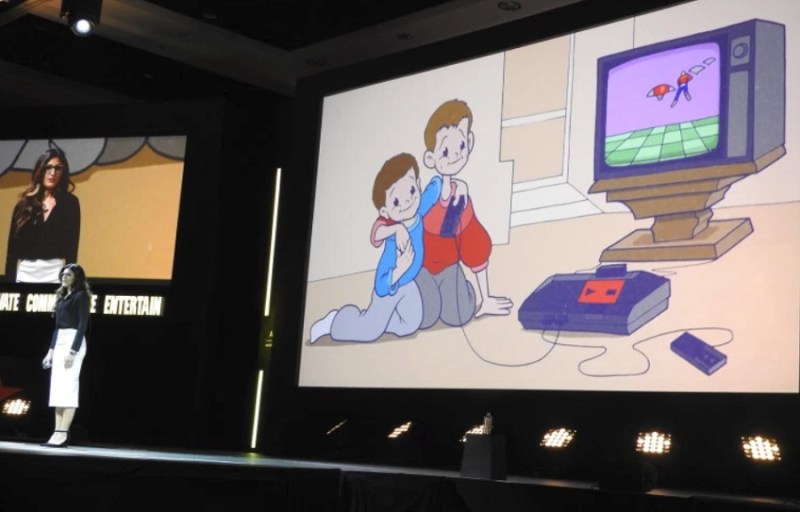
Above: Maja Moldenhauer with an illustration of Cuphead designers Chad and Jared Moldenhauer.
Moldenhauer said in an interview at the DICE Summit gaming event that the success has given the team — staffed by former web page designers, construction workers, and financial analysts — the financial stability to continue making games for the long term. I couldn’t finish the game, but it has a rabid base of fans who appreciate its difficulty, which was born from the desire of Studio MDHR cofounders Chad and Jared Moldenhauer to make a game that reminded them of the platform games they grew up with.
The game’s difficulty meant that a lot of players couldn’t finish it, but that helped create an aura of attention around Cuphead, and skillful players appreciated how it took precise control of the analog controller sticks to master the moment-to-moment, variable gameplay. Cuphead’s designers had a vision that they never compromised, even though the company was always low on both money and experience, Moldenhauer said.
They had a relentless focus on making a difficult game that required skill to beat, and it turned out this idea resonated with all of the fans who long for retro games, admire the skill of speed runners and elite players, and appreciate old-style games where gameplay was king. A lot of people made fun of how I was terrible at the game, and Moldenhauer and I talked about that — and the problem of cyberbullying — as well.
Here’s an edited transcript of our interview.
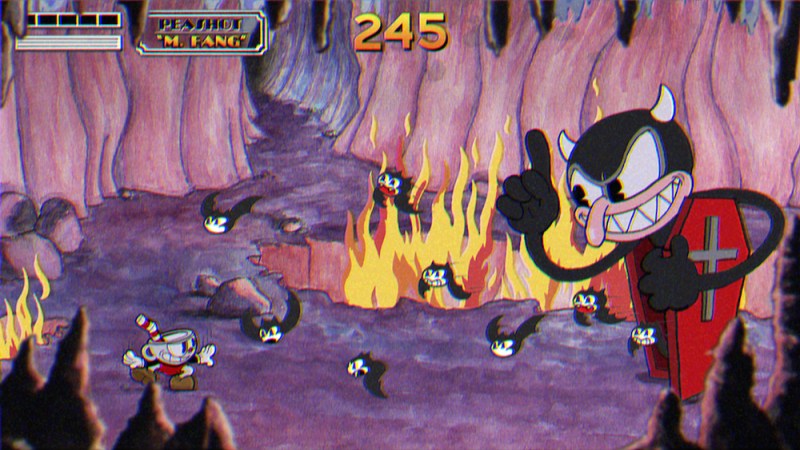
Above: Cuphead’s aniimated backgrounds are positively Street Fighter-inspired.
GamesBeat: Was there a main message or a theme you wanted to get across in your talk?
Maja Moldenhauer: The theme of DICE this year is “Made Better.” You’ll probably hear this repeated in my talk. When I got the call to be a keynote here, I was a bit confused. What am I going to teach these people? I’m a student here still. The way we looked at it — from a fresh lens, from a fresh perspective, not having made 20 games before, how did we pull this off? Where did we invest in making sure the game was up to par in terms of where we saw quality and how we got there? I’m going to be taking a view from the trenches, giving some color to that.
GamesBeat: I remember your talk in Montreal, where you said it wasn’t a fairy tale. Is it important to get that across to people, that it’s not an automatic success?
Moldenhauer: I’ll be touching on that, yeah. It’s been so romanticized in the media. It’s not wrong. We did re-mortgage our homes and quit our jobs. But it was never as if we woke up one morning and it happened. There were baby steps. There were pulse checks. We weighed risk and reward. We knew what we were doing as we went along. There were checkpoints we had to hit before we ever made the next step.
GamesBeat: It seemed like, at some point in the process, you started organizing things. I don’t know if you’d describe it as taking control of the process, but you didn’t start that way, right? You graduated into this role.
Moldenhauer: Exactly. Initially, I just started on the art side. Then every time we missed a target date or a timeline and we realized how horrible Chad is at projecting timelines, I said, “No, I have to take the reins here.” That’s how my role evolved, from the art side to a lot of the production side.
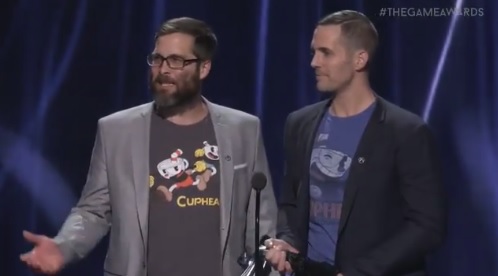
Above: Jared and Chad Moldenhauer, leaders of Studio MDHR, maker of Cuphead.
GamesBeat: Was that any tougher because it was a family thing?
Moldenhauer: Um, yeah?
GamesBeat: “Chad, you’re fired.” [laughs]
Moldenhauer: And then when it came to art, he’d be like, “No, you’re fired!” [laughs] I think we were balanced evenly. Chad is like a sponge. He takes a lot. He’s a really good guy. There were days where I would be a little bit more stressed than he was, while he’s so even-keeled. It’s a good balance.
GamesBeat: Keeping everyone on time that you developed a skill for, then?
Moldenhauer: I tried. I don’t know if I got there. From an education perspective, for Chad — he would never pay attention to timelines. We would project, “Okay, this boss is going to take four weeks. A week to concept, a couple of weeks to animate, a week to color and ink.” If, in that first week, we didn’t get the concept of what that boss was going to look like down pat, he didn’t just pick the best one. It would be another take, another take, another take. If that turned into three weeks, it took three weeks. We never compromised or settled. That’s where the bulk of our delays were rooted.
In hindsight, it was the right decision, rather than settling. It was unfortunate for the people who were disappointed in the delays, the vagueness and the black of hole that was Cuphead for a couple of years. But hopefully it was worth it.
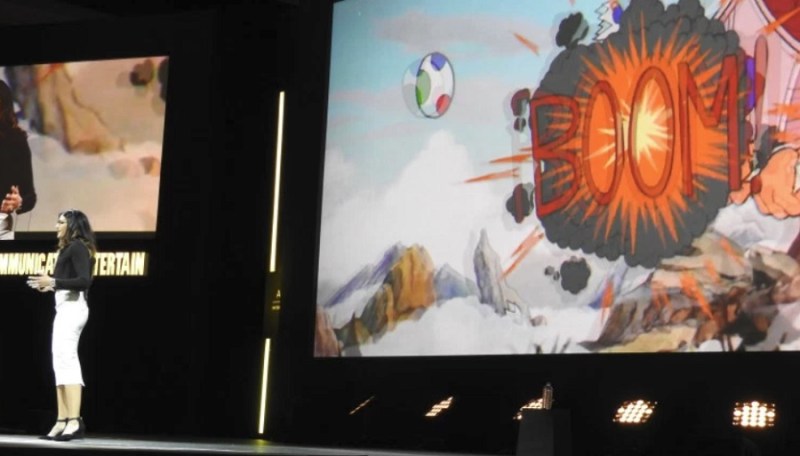
Above: Maja Moldenhauer at the DICE Summit in Las Vegas.
GamesBeat: What are some of the other hindsights you have?
Moldenhauer: When we were in the thick of it, it never felt like — in hindsight I look back and think, “How did we pull that off?” I look at the bank boxes of paper all around our basement and I wonder if I’d have been as eager about doing it if you told me I would have to ink 60,000 frames of animation. I don’t know. Maybe I would always be thinking, “I only got 100 done today, 60,000 to go.” But in the thick of it you’re just focusing on that 100. You don’t know how many more there are to come. That’s a big one.
GamesBeat: All hand-drawn?
Moldenhauer: I know! On paper. It’s crazy. Probably a horrible idea. [laughs]
GamesBeat: I saw that you had some reinforcements come in for the last couple of months?
Moldenhauer: There’s a company based out of Montreal called Illogika. They were life-savers in terms of — they did a lot of support for us. As you’re going through the final stages of testing and things like that, the last three-four-five months, and realizing precision wasn’t here, or something wasn’t programmed perfectly there — being able to pull in that team to help us with development, testing, support….
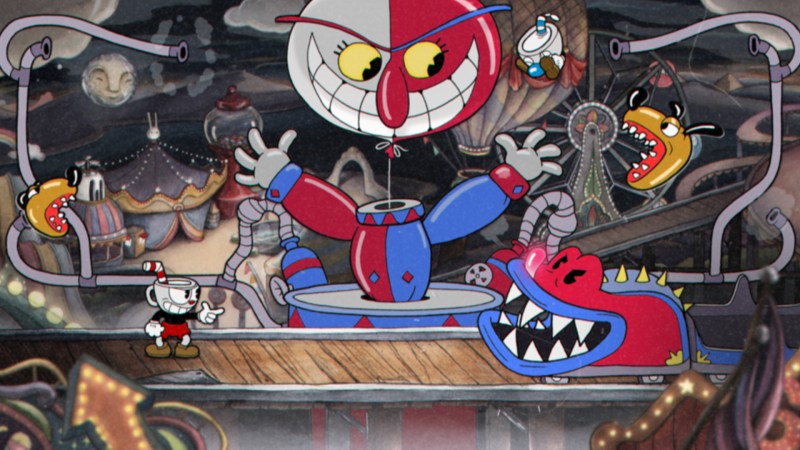
Above: Cuphead Fun House.
GamesBeat: Did you find them, or did Microsoft find them?
Moldenhauer: We found them, I think just through a Google search? We found almost everyone that way. A lot of our animators said, “How did you find me?” Because we hand-picked our people. But usually we just googled it.
GamesBeat: Did that almost double the size of your team?
Moldenhauer: There was a time where it was closer to 30. Quite a few people.
GamesBeat: What were some of the reactions interesting, from your perspective today?
Moldenhauer: I would say my favorite was the amount of fan art out there. We look at a ton of fan art, and we love it. From two-year-olds to six-year-olds — it comes in all different shapes, sizes, and colors, and we love it all. It’s so weird to see something that you created and somebody’s doing their own rendition of it. They have this fan group where they share it with their friends. It’s crazy. That’s definitely a highlight.
A lowlight is the amount of bullying that’s out there. We touched on this at MIGS and I’ll touch on it again, because I just saw it the other day in this — maybe it’s because we don’t really pay attention to comments or things like that. I don’t think Chad’s ever even read a comment. Not out of, “Oh, I don’t want to read comments,” but just because he doesn’t have time for it. But there was this one fan group with a little girl who’d drawn a Cuphead and Mugman picture. She couldn’t have been more than 10 years old. It was brilliant. It was so cute and it was her adaptation of it, and somebody else had commented on her picture in this fan group just cutting her down, using so many profanities. And then another person chimed in and they were heckling. It was the most disgusting thing I’d ever seen.
I don’t comment or reply or get involved in a lot of these things. But I did at that moment. “Actually, this is one of the best things I’ve ever seen. I printed it out and it’s in our office.” And I did. I printed it out and put it right on my billboard. It’s a reminder of, one, how many people look up to this, and two, just be kind. Why not? It’s harder to be mean.
GamesBeat: I hadn’t seen that. I felt like I was the center of that universe for a little while.
Moldenhauer: Oh, God. That was so ridiculous. When things go viral like that you can’t even control it. But we obviously saw it, and saw your reply too. That was so eloquent. The support that you got out of your company, I think, was strong. People are just vicious sometimes. I don’t know how you do it. I don’t have very thick skin. I’m very vulnerable to it.
GamesBeat: It had never happened to me on that level before. I was trying to argue with one or two people, and then I found I was actually arguing with a thousand people. “Huh, maybe I should change my mind about this?”
Moldenhauer: Your opinion should stay your opinion. Don’t let other people influence it.
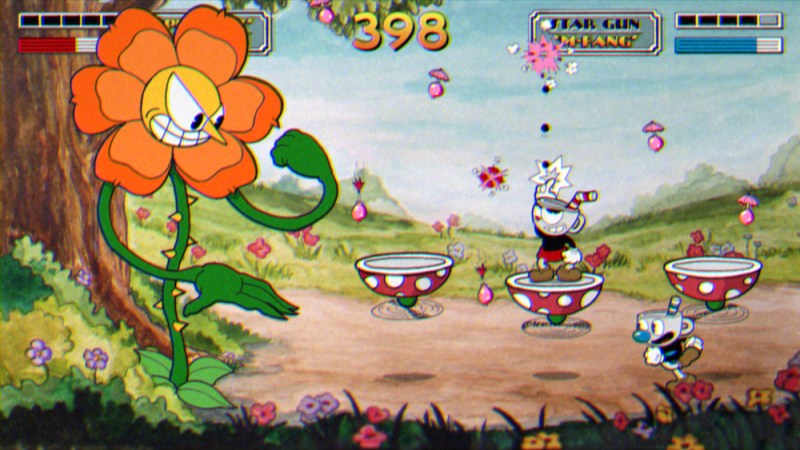
Above: Cuphead faces a very fierce and angry flower.
GamesBeat: I don’t know if you guys felt some of that same kind of heat as well, at different times along the way.
Moldenhauer: There were obviously times when—a lot of people would try to dissuade us from doing this. When we would give out a demo, a playable demo, internally or to different colleagues or whoever at the time, we’d hear, “It’s way too hard. We can’t market this to anyone.”
We just let it roll off our shoulders. Every time we’d hear that, we’d pat ourselves on the back, because that was our intention. This is the kind of game we’re making and we’re confident in it. You’re 100 percent entitled to your opinion if you think it’s too hard, and we respect that. But for us, we were really firm in our vision and what we wanted. Every time we heard that—that’s your opinion, and that’s great, but we’re going to stick with this kind of game.
GamesBeat: In hindsight, I don’t think many games make such a strong decision, or many developers. They don’t put their feet down and say, “This is what it’s about.” It’s interesting that you chose that particular — that difficulty was what you were going to put your foot down about.
Moldenhauer: That’s another hindsight thing. It’s one thing that was never — I’m a bit more pliable than Chad and Jared are. If somebody’s really getting at me about something, I might think, “Okay, maybe.” But the whole time they said, “Nope, this is the kind of game we want to make, and that’s that.”
The times where it gets a little blurry are maybe when there are too many cooks in the kitchen. With this one, it was Chad and Jared. Since they were six or seven years old, this was the game they were going to make when they grew up.
GamesBeat: Did you discover that this is a kind of subculture? That lots of other people felt that way? That was something I didn’t realize.
Moldenhauer: That surprised us, yeah. Like I was saying earlier, we never thought — I’m talking, we thought lifetime sales would be a fraction of where we’re at now. We thought this was just not where the world is right now. People want to play modern games and the ‘80s are dead. We thought there was just this small niche group of people that we would capture, and we were fine with that. There was no other option. Obviously this subculture that’s now been formed, these fans and these people putting videos up of playing and completing with A+ scores.
GamesBeat: The speed runners.
Moldenhauer: Oh, yeah, that was always a dream, that we’d love to watch somebody speed run it. When that happened so quickly we were like, “Yes!”
GamesBeat: There are these lightning strikes that all seem to have happened together. You discovered that group. Everybody liked the retro art style, the 1930s inspiration.
Moldenhauer: It was just a perfect storm. A lot of things clicked for people.
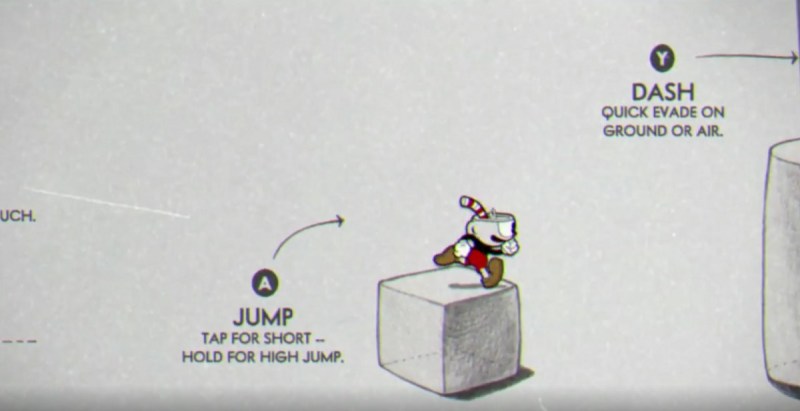
Above: Cuphead tutorial. It’s different in the final version.
GamesBeat: Are you talking about how much it’s sold so far?
Moldenhauer: I think publicly we announced double platinum, 2 million sales. That was December 1. It’s following a bell curve in terms of sales. It’s slowed down, for sure. But we’ll likely announce our next milestone. I’ll leave that as a mystery for now.
GamesBeat: What does that enable for you guys? What future are you looking toward?
Moldenhauer: We get to keep doing this and we’re going to do it for a very long time. That’s singlehandedly been the best news ever. I was laughing with my girlfriend, because I had just bought a new car. She says, “Oh, look at you, a fancy new car.” Thank God my old hunk of junk lasted until now, though. Everything was hanging by a thread. Our fridge died last week. Both of our cars died just in the nick of time.
That’s nice to have, but this sounds so hokey and cliché, and you’re going to think, “Yeah, sure,” but the ability to continue doing this is really what counts. To keep these people employed that are on our team. That’s the best news ever. That’s what’s really driving this.
GamesBeat: Are you thinking about — do you want to keep serving those same fans, or do you want to do something else?
Moldenhauer: It could be a blend of both. [laughs] We haven’t formally come out with what we’re working on right now. But I think it’ll be a blend of both worlds. It will serve our current fans, and I also believe it’s going to help elicit some new ones, hopefully.
GamesBeat: What are some pieces of advice you’d have for others following in your footsteps?
Moldenhauer: The key things that worked for us — we’ve touched on them a bit in this conversation. Know what you want and stick to it, but make sure you have a clear vision before you stick to your guns and don’t seek outside opinion, things like that. If you’re not 100 percent positive, it’s worth talking to the experts, talking to colleagues, growing that body of knowledge for yourself before you go off and decide what you’re going to do and how you’re going to do it.
We were lucky enough to have experience with games, playing them our entire lives, so that we knew exactly what we wanted. We stuck to our guns. But don’t jump into the deep end. Don’t quit your job and mortgage your house in one day. [laughs] I made sure that I had the connections to go back to the bank if this didn’t work out. I would be able to secure a job within a couple of weeks. If it didn’t work out we’d start back from the beginning. That’s not the end of the world. We’re young and we’d be able to get back there.

Above: The Forest Follies level in Cuphead.
GamesBeat: You had a safety net.
Moldenhauer: Yeah, yeah. Last, I would say that karma is real. Be kind. Be nice. Don’t wish bad things on other people. Don’t knock somebody down because they have an opinion. Don’t knock a company down because they didn’t make a game that you think it’s great. They think it’s great. Respect that. That’s a very big one. And have fun.
GamesBeat: I’d like to see gamer culture change in those ways.
Moldenhauer: It’s terrifying, because I feel like it’s going in the opposite direction. I don’t know the answer for reeling it in. I don’t know what the solution is there. My fear is that it’s not going in that direction.
GamesBeat: If you step too far into opposing that you just become a target.
Moldenhauer: Exactly. Be kind. That’s my last one, in general. Nothing is that serious.
GamesBeat: There’s a certain amount of attitude that’s maybe okay to have while you’re playing games. It sounds like the brothers were into that themselves. “I can beat you,” that sort of thing. I thought the interesting thing when I was actually playing for a longer period of time — that moment to moment touch on the stick was so important. It seemed like every round of the same boss could be different. You couldn’t just robotically beat something.
Moldenhauer: Exactly. That was intentional. You’re not going to get it on the first round.
GamesBeat: If you reacted at the right moment, every moment, you’d get through. I finally got to appreciate the skill involved in the game when I really tried.
Moldenhauer: Here’s the thing that makes me mad. I don’t want to harp on this, but that whole situation — how many games had you played that day? Probably 10 or so? You’re unfocused. You’re on this tiny little chair. You’re not in your own space. That’s not a good test of things like that. I’m glad to hear that.
GamesBeat: Still, I was sad that I couldn’t beat it.
Moldenhauer: Don’t say that like it isn’t over. [laughs] You still can! You’ve got lots of time. But that was all purely intentional. If somebody beat it on the first crack we didn’t do our job. We intentionally made it so you have to get a little farther every time. You’re never going to make these big leaps. If you can you’re either a prodigy and we didn’t do our job as we had intended.
GamesBeat: It’s so rare to have a game like this. Call of Duty, I can learn that in the course of six weeks or so and get through. At this point I’m 80-ish levels in, and I feel like I’ve mastered it enough. But this is not a game where that automatically happens. You’re not guaranteed to progress just by putting time in. You have to get in touch with your body, your fingers.
Moldenhauer: Exactly. That’s so cool hear that, because that was what we intended.
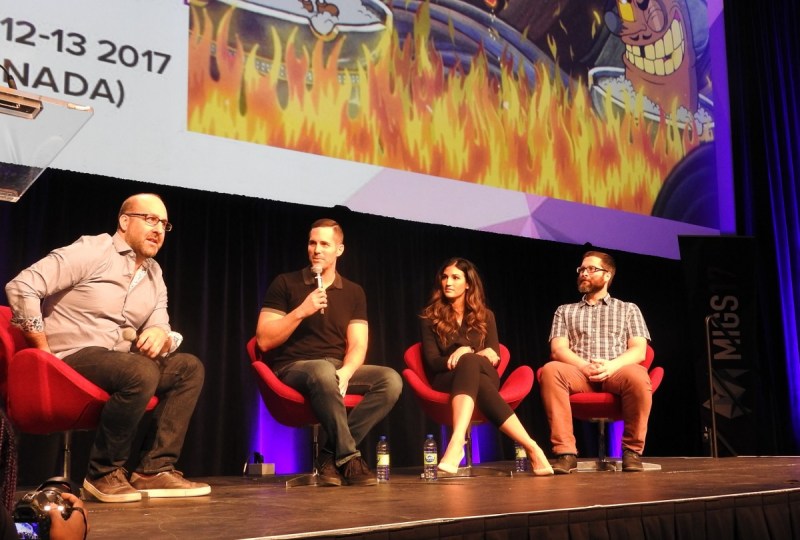
Above: The Cuphead creators at MIGS 2017’s opening fireside chat.
GamesBeat: If you focus on that as your thing, I feel like you’ll be successful.
Moldenhauer: 100 percent. That’s it. That’s the kind of game they want to continue to making. They’re not always going to be the boss rush, not always going to be a platformer. There are different branches in our foreseeable future. But that difficulty level, having to play it to learn it and not just memorize things — that was a great analogy. You have to feel it with your body. You really do.
GamesBeat: Did you find some insights by watching people play it?
Moldenhauer: We were a bit selective in terms of who we playtested with. We didn’t want to waste our time with somebody we knew would say, “Well, I hate this kind of game.” We playtested it with a lot of the guys and girls that Chad and Jared grew up with, that played the same kind of games that influenced this one. They could appreciate it and give insight in terms of, “Oh, do you remember when Street Fighter would…?” Give insight that was valuable to us.
At the same time, we did listen to Microsoft’s QA and Illogika’s QA. “This isn’t really working. That’s not really working.” But in terms of material changes to how the game functions, that kind of rolled off our shoulders. “That’s an interesting perspective, but we’re going to keep going down our path.”
GamesBeat: It sounds like their biggest nightmare might be if the consoles ever got rid of controllers with analog sticks.
Moldenhauer: That would be, absolutely.
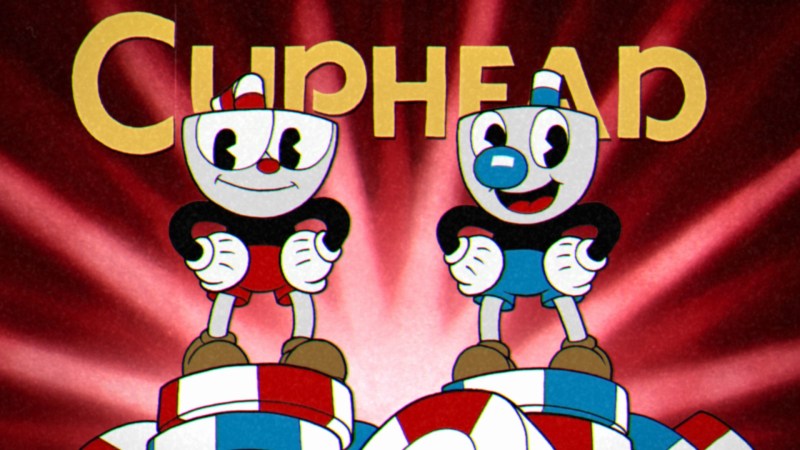 GamesBeat: Now it’s all touch screens.
GamesBeat: Now it’s all touch screens.
Moldenhauer: No! You can’t play a game with a touch screen. It’s like that one director — I can’t remember his name – but there’s this video of somebody watching a movie on their phone, and he’s like, “You can’t watch a movie on your phone!” We’re the same way about controllers, for sure.
GamesBeat: I imagine you’ve gotten to meet a lot of the stars of the industry.
Moldenhauer: Oh, yeah. I’m a bit star-struck a lot of the time. These people are legends, right? They made games we look up to. That’s been really cool, forming relationships where—for example, there’s one very close to home. Capybara Games, Nathan Vella, when we were just starting out and going through this, we would always look up to them. Or Behemoth. And then you meet them and they say, “Your game’s so cool!” Am I on a hidden camera or something? That’s been really neat.
Just being at places like this, meeting people who are in the same industry, we don’t get a lot of that in Oakville, Ontario, Canada. I pick up at my kids’ school and all the other moms and dads ask, “Oh, what do you do for a living?” I tell them and they say “Oh” politely and walk away.

